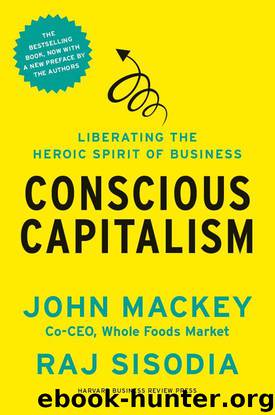Conscious Capitalism, With a New Preface by the Authors: Liberating the Heroic Spirit of Business

Author:John Mackey & Rajendra Sisodia
Language: eng
Format: mobi
Tags: Business Ethics, Management, Free Enterprise, Business & Economics
ISBN: 9781625271754
Publisher: Harvard Business Review Press
Published: 2014-01-06T14:00:00+00:00
Media
The media should also be considered a stakeholder, and the company’s relationship with it should be managed accordingly. It is important to understand what the media wants and how to constructively engage with it. This can lead to synergistic relationships that create value for both the media and the business.
The media tends to focus and report on the three Cs: controversy, conflict, and change. It sometimes spins things to make them seem controversial and looks for conflict where there isn’t any. Members of the media are always interested in writing about change, both positive and negative.
The traditional media needs to evolve and become more conscious. This means rediscovering its higher purpose. For the news media, its higher purpose probably should be to seek and disseminate what is true. A good investigative journalist has a passion to unearth things and get the truth out. Many people have lost trust in the media because they think it is no longer honest with them, but is more interested in spinning a story or engaging in entertainment or sensationalism to attract a larger audience.
To a degree, the media has become philosophically corrupted by the postmodernist philosophy that there is no objective truth, only subjective interpretations that are dependent on context and viewpoint. From this perspective, all interpretations are seen as equally valid, and one’s ideology becomes the dominant prism through which to view reality. People then twist things to make them fit their ideological biases, rather than evolving their beliefs and ideologies to fit the evidence and facts. If the media were to reengage in the pursuit of the objective truth, even though the reality of context and viewpoint will always exist, it could regain public trust and serve a more beneficial role in our society.
When it functions well, the media makes all societal institutions, including business, better because it fosters a higher level of openness, transparency, and accountability. Of course, the media frequently goes overboard, and many business leaders have felt the brunt of overzealous, inaccurate, and agenda-driven reporting. But overall, there is no question that having a free media delivers significant societal benefits.
Traditionally, members of mass media such as newspapers, television, and radio have operated as middlemen, interpreting events about the business to the outside world. Businesses had no easy ways to connect directly with many of their stakeholders except through the interpretations provided by the media or through expensive advertising. This made businesses both dependent on the media and vulnerable to the various interpretations, spin, and filters the media might use to explain events. Now, with social media such as Facebook, Twitter, YouTube, as well as through company websites, it’s much easier for a business to engage directly with its stakeholders without needing the traditional media to act as a go-between. Social media created a revolution because it allowed businesses to have a more direct, ongoing connection with their key stakeholders, which is very empowering. At Whole Foods Market, we have a communications team that is focused on earned media (primarily, public relations), social media, in-store communication, and community involvement.
Download
This site does not store any files on its server. We only index and link to content provided by other sites. Please contact the content providers to delete copyright contents if any and email us, we'll remove relevant links or contents immediately.
| Ethics | Etiquette |
| Fashion & Image | Health & Stress |
| Motivation & Self-Improvement | Work Life Balance |
| Workplace Culture |
Tools of Titans by Timothy Ferriss(8369)
Change Your Questions, Change Your Life by Marilee Adams(7761)
Deep Work by Cal Newport(7068)
Playing to Win_ How Strategy Really Works by A.G. Lafley & Roger L. Martin(6252)
Man-made Catastrophes and Risk Information Concealment by Dmitry Chernov & Didier Sornette(6007)
Big Magic: Creative Living Beyond Fear by Elizabeth Gilbert(5756)
Digital Minimalism by Cal Newport;(5750)
Ego Is the Enemy by Ryan Holiday(5417)
The Slight Edge by Jeff Olson(5410)
The Motivation Myth by Jeff Haden(5206)
The Laws of Human Nature by Robert Greene(5179)
Stone's Rules by Roger Stone(5081)
Tuesdays with Morrie by Mitch Albom(4772)
Eat That Frog! by Brian Tracy(4526)
Rising Strong by Brene Brown(4451)
Skin in the Game by Nassim Nicholas Taleb(4240)
The Money Culture by Michael Lewis(4198)
Bullshit Jobs by David Graeber(4179)
Skin in the Game: Hidden Asymmetries in Daily Life by Nassim Nicholas Taleb(3993)
